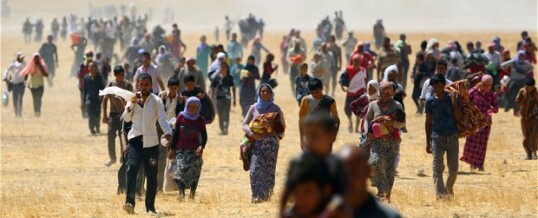
McLeod Group Blog, December 15, 2014
It has been several weeks since the deployment of Canadian military assets in Iraq, primarily aged CF-18 fighter aircraft, to be part of the anti-ISIL coalition. It is not clear how Canadians feel about this latest projection of ‘Canadian values’ through the Harper government’s ‘principled’ foreign policy. It is clear, however, that the government’s claim that this is to be a six-month engagement cannot be taken seriously.
One especially murky aspect of the deployment is the price tag. Given that there are approximately 600 military personnel involved in the operation, six fighter jets, one refuelling aircraft, two aerial patrol planes and some training for Kurdish peshmerga forces, it isn’t difficult to get to a budget of $500 million for a six-month outing. Apart from bombing some bulldozers, is this having any impact? Is this really a good use of Canadian taxpayers’ dollars?
Working past the media hysteria about ISIL, we should be asking ourselves why Canada and other—mostly Western—nations are waging war against a backdrop of irresponsible local leadership, marked chiefly by squabbling (or more lethal forms of interaction) over political supremacy. From a safe distance, the conflict seems intractable, and the desperate situation of much of the civilian population who are being displaced, shot, blown up and beheaded appears to be of little concern to local and international political leaders.
What is being done to address the causes of the conflict? Could Canada do anything through diplomacy to lessen the conflict—at the very least to help to bring about a ceasefire, so that some political compromises can be identified and developed?
Probably not. The Harper government’s stance on Middle Eastern issues, best summarised as ‘Israel, come hell or high water’, has made Canada irrelevant in any search for diplomatic or political answers. We’ve cut all channels to key players—such as Iran and Syria—who will have to be part of any solution. And like it or not, Russia also has an important role to play. But don’t look to Canada to do anything on that front; our foreign minister seems to take an almost perverse pleasure in irritating his Russian counterpart. If multi-party discussions do take place, our role is more likely to be the skunk at the picnic than anything else.
It is the civilians, of course, who are suffering, as is usually the case when the causes of conflict go unresolved. Reports from the field describe a situation where the humanitarian principles of neutrality, impartiality and independence are under pressure, especially the latter as the leaders of the various factions strive to control the flow of aid. At the end of November, there were over two million internally displaced persons in Iraq, and hundreds of thousands more living in areas of active conflict where access to basic services was minimal. According to the UN Office for the Coordination of Humanitarian Affairs, only 32% of the US$2.2 billion appeal for Iraq for 2014-2015 had been met by December 15.
The website of the Department of Foreign Affairs, Trade and Development, which is responsible for Canada’s humanitarian action, lists humanitarian assistance in 2014 totaling $37 million in Iraq. As with other Canadian government numbers, these are difficult, if not impossible to decipher. Some of the funding pre-dates ISIL, and some is for Syrian refugees.
So, that’s $500 million for bombs, and maybe, at the outside, $37 million for humanitarian aid. Smart? No. Are we getting results for our huge expenditure on new bombs in old planes? No.
ISIL is very bad news, but $500 million—and the next $500 million that is undoubtedly coming down the pike—could be much better spent on more strategic efforts. And on working to alleviate the suffering of the victims.
